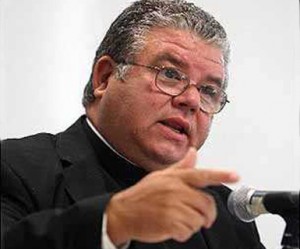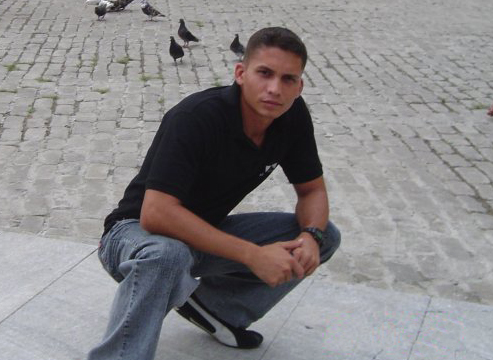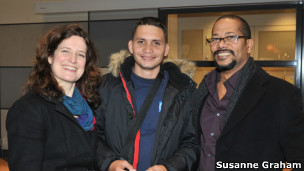 Eliecer Ávila (center) was met in Stockholm by the creators of LaCubanada.com, Susanne Graham and Alexis Ferrer Colas. (From BBC)
Eliecer Ávila (center) was met in Stockholm by the creators of LaCubanada.com, Susanne Graham and Alexis Ferrer Colas. (From BBC)
Category: Eliecer Avila
Eliecer Avila Takes to the Crowded Skies
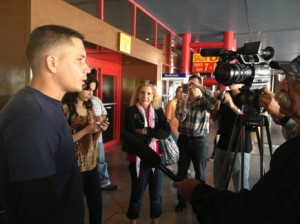
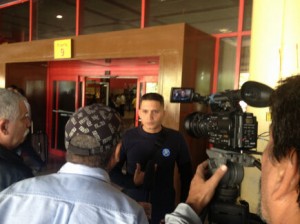
 Site manager’s note: Eliecer Avila is the computer science student who, in a session at his university where Ricardo Alarcon, vice president of the National Assembly, came to meet with the students, asked Alarcon a series of questions that the students needed answers to, “to help us do our work.” Their work was monitoring the internet and responding to the regime’s critics. The session was videotaped and the video eventually found its way into cyberspace.
Site manager’s note: Eliecer Avila is the computer science student who, in a session at his university where Ricardo Alarcon, vice president of the National Assembly, came to meet with the students, asked Alarcon a series of questions that the students needed answers to, “to help us do our work.” Their work was monitoring the internet and responding to the regime’s critics. The session was videotaped and the video eventually found its way into cyberspace.
Although Eliecer was sincere in his inquiries — the students truly wanted ammunition to do a better job supporting the regime — Alarcon’s answers exposed him to ridicule as the video went viral around the world.
Among his most surprising answers was that one of the reasons Cubans could not travel freely was because if they did so, there would be too many planes in the sky.
Both men’s lives changed. Eliecer was expelled from the university and ultimately became an activist for a free and democratic Cuba. Alarcon, who was Cuba’s representative to the UN for nearly thirty years, and later Foreign Minister and who, as of this date, remains the president of the National Assembly, will be replaced in that post after tomorrow’s elections.
Today, Eliecer is taking his chances in the crowded skies and traveling outside Cuba for the first time. Photos are from Yoani Sanchez’s twitpic.
Here is a link to Eliecer’s and Alarcon’s conversation, with English subtitles.
2 February 2013
This Is Not Spoken Of / Yoani Sanchez #Cuba
Brick by brick Eliécer builds the pen for the pigs, washes the floor with a hose and feeds the plump sow that recently gave birth. A neighbor passes by and shouts to him, “Hey! ‘Your friend’ Alarcón is no longer in Parliament!” The words are out of sync with the situation, bringing a dose of highly charged politics to the harsh day-to-day. But for the young man from Las Tunas such contrasts are already common.
Five years ago he was in a meeting room at the University of Information Sciences with a microphone in his hand. Today, he tries to earn a living in the midst of the material shortages and misunderstandings of a provincial town.
When the list of deputies to the Eighth Parliament was published a few days ago, many immediately thought of Eliécer Ávila. In January of 2008, then a student at the University of Information Sciences (UCI), he questioned the President of the National Assembly who responded with Manichean — and even ridiculous — arguments.
The video of that moment spread with a velocity unprecedented in the newly opened alternative networks for distributing audiovisuals. This event contributed to the acceleration of the countdown for Ricardo Alarcón. A fall from grace already anticipated by his not being included in Fidel Castro’s proclamation when he delegated power to the men he most trusted. The veteran diplomat become parliamentarian was not among those chosen to occupy one of the major posts of the government. It only remained for his replacement to become effective, which — at the slow-moving pace of the Cuban Nomenklatura — will occur in February 2013.
Beyond the ousted official and a young man with the energy and clarity to go much further, it’s worth analyzing how the news has played in the Cuban press. Over the entire week it has published the name and a short biography of each deputy. It has also analyzed the percentage of women, farmers and young people who will occupy the seats in the Palace of Conventions… but without a single word about the current parliamentary president who will step down from his post.
Can you imagine a press, truly attentive to reality, that doesn’t mention what is spoken about in every street, every corner, every Cuban house? Can you conceive of Eliécer Ávila’s neighbors having a better “nose for the news,” being better informed, than all the reporters of the newspaper Granma?
Yoani Sanchez
To My Cuban Brothers and Sisters in Exile / Padre Jose Conrado Rodriguez Alegre
In Santiago de Cuba it is just dawning. Today, Friday October 26, 2012, just 48 hours after the horrible devastation left behind Hurricane Sandy, I got up early to pray and write. Amid the sadness for so many families left destitute, as Eliseo Diego said of the man with the bundle on his back, in his “Book of the Wonders of Bologna”: “Pilgrim you go with the dusk and your poor belongings: fears, sorrows.”
So I see my people, wandering among the ruins of what little we have of which nothing is left to us. And yet, I say this with the utmost pride in my poor people, who think kindly of each other and offer their hand, and with the strength of the poor they say in the vortex of misfortune, “It doesn’t matter what we lost, we are still alive.”
Yes, I have seen many signs of solidarity, like my parishioner Tito, a young medical student, who has come to clear the debris from the houses of his neighbors and relatives, and yesterday he spent the afternoon with Pavel, his brother-in-law, saving the zinc roofing sheets lying in the patio, which we returned to the rectory roof.
My sister and her 15-year-old stepdaughter who have cleaned the first floor of the rectory, while the second is being roofed. Manolo and Mario, who despite the dangerous winds, placed the tiles to protect my books, computers and printers from the weather.
Gladis and her grandson Pedro, who were the first to arrive to lend a hand, although they still had a great deal of debris to sweep up in their own house. And Eliecer Avila, who came from Puerto Padre to help, because he could not sit there, knowing how badly things were for us here.
Yoani Sánchez and Reinaldo Escobar, who from Havana let me know they were collecting food and medicine for the victims. My brother Roberto Betancourt, who from his parish of Caridad sent me the warmth of his flock, as did Ophelia Lamadrid, with her ninety years, and Teresita de la Paz, the widow of Gustavo Arcos Bergnes, who pray for me and for my people. They have told me about the mobilization you have already started to send aid “so much more urgent now that our need is so great.”
My beloved brothers and sisters: from this distance and immersed in supreme suffering after the inevitable and disarming misfortune, I say from my heart, that I have felt, in all this time of uncertainty and bitterness, when the roof blow off my parish and my home, running to save the books and what I could from the rain and afterwards, when I could go out and see the desolation of my people, I felt your presence, your prayers and the solidarity of all of you.
I knew that we were not alone and that we could count on the the love and support of all of you, of all our friends, Cubans and otherwise, who from far away accompanied us with your prayers and your love.
In particular, when I went to pray for an elderly woman who died of a heart attack in the midst of the storm, sheltered in a small bathroom, with her daughter, granddaughter and her two little great-grandchildren in a house flying to pieces through the air, her heart could not resist so much anguish and exploded. Mine bleeds for all the misfortune of my people.
The city lies in ruins. My old parish of San Antonio María Claret, in the neighborhood of Sueño, collapsed. Only the Christ that I one day put on the wall of the chancel, stood as a silent witness along with the granite altar that stood there for 30 years.
So did my old church of San Pedrito, whose repair almost cost me prison. Just as my beloved town of San Luis, where I was born to the faith and then began my pastoral work as a priest, and whose new marble altar was consecrated in solemn ceremony less than a month ago. And this has happened with almost all churches, rectories and convents throughout the diocese … They lie in ruins, they are homeless or have been seriously damaged.
But what is it, I wonder, before the suffering of so many people who have lost everything: the effort of entire lives and even generations, transformed into offal dripping mud and dust. So too the books, televisions, and other household appliances, furniture… and the house!
It is calculated that 150,000 houses are destroyed or seriously damaged. And this in the midst of such a difficult economic situation, virtually of survival! We felt that we were so badly off… and now we are much worse!
But back to my memory, the first sentence I said, and that I have heard from so many mouths: But we are alive! Thanks be to God for the life that He gives us and for keeping us, because it is amazing that in the midst of so much devastation the dead have been so few. What does God want to say to us with all this?
Father José Conrado Rodríguez Alegre
Santiago de Cuba
Translated from Cubanet on 5 November 2012
Knights in Extinction / Eliécer Ávila
 Recently I had the opportunity to meet some examples of an almost extinct kind of men who trained in their professions or trades prior to 1959, and who still preserve the way of working and living that they learned then.
Recently I had the opportunity to meet some examples of an almost extinct kind of men who trained in their professions or trades prior to 1959, and who still preserve the way of working and living that they learned then.
It is impressive to talk with these gentlemen; they have a kind of elegance, presence, a way of projecting themselves that simply inspires respect.
The barber I want to talk about is 76 and lives in a building almost in ruins in Central Havana. He has cut the hair of every kind of Cuban from the ‘50s until today. The small place he uses as a barber shop is a museum that jealously guards objects and documents: electric hair clippers, facial massage vibrators, blades, and God knows how many other things.
From the moment I knocked on the door, this gentleman made me feel like a real customer. The way he treated me made me believe my money had no value. We were alone, no one was shouting or interrupting the explanation he leisurely gave me about the services he could offer. The whole time he addressed me formally and with respect.
Once seated, the first thing he did was to make sure I chose well and conveyed to him, sparing no details, how I wanted my hair cut. Then he smoothly got to work, able to bend his body to access different levels without having to bother me about it, and if it was unavoidable that I needed to change my position, he said “please” and “thank you.”
I was so satisfied I decided to take advantage and get a facial mask and massage. All the work was completed professionally, leaving me looking good enough to go to a reception.
On asking the price I got another great surprise, “It’s 20 Cuban pesos,” he answered with a friendly gesture. [Less than a quarter, U.S.]
Everyone who lives in Havana knows that this price is amazing for a haircut and two additional services. I gave him a modest tip: the most willing I have ever given!
I looked discretely through the door, ajar, and noticed a very humble home. I couldn’t help but ask, “Sir, forgive my indiscretion, but, I can’t believe you can charge so little? Do you plan to retire at some point?”
“Young man, I retired long ago,” he said, “but with what they pay me I can’t eat for even four days. And the price… I consider it fair. The fact that I don’t have enough money doesn’t mean I have to exploit others, who also do not have enough money. On the contrary, instead of raising prices we should all do the opposite and help each other.
“In my hometown, Camaguey (before this, of course), when things got tight and some families could not afford enough food, the shopkeepers gave them credit until things improved, or they lowered the prices and, in some cases, even gave products away. That doesn’t happen today. On the contrary: they’re at loggerheads with each other and I am dying of grief at the sight. Hopefully, God willing, you’ll live to see things get better. Me, I don’t think I’ll see that again.”
The words of this old man shook me up. There was no room in my mind for how a man, trained in a system that, according to some, “turns men into bloodthirsty beasts,” could have such convictions and feelings.
Thinking about this, my grandparents also came to mind, their values, their “Cubanness,” their endless honesty. And then I wondered if it will be best to continue inventing the happy “New Man,” which seems to move farther and farther from its original project, or, conversely, if it might be worth trying to recover the old man, who was already pretty good and whom we are losing completely, at the risk of being left with none.
From Diario de Cuba
8 May 2012
Eliécer Ávila and Ricardo Alarcón Face Off / Eliécer Ávila
Video is 49 minutes long.
Note: If the video doesn’t work please put this link in your browser and it will appear:
Click here, or
Insert this line into the menu bar and choose SUBTITLES in the bar under the video: http://amara.org/en/videos/2sn3NOO3uzTj/info/alarcon-y-estudiantes-de-la-uci-video-completo/
Notes: This video came to light in February 2008. It was filmed at Cuba’s University of Information Sciences (UCI), located in Boyeros, Havana, and is of a large meeting where students had an exchange with Ricardo Alarcon, President of the National Assembly. This version of the video omits portions of the event from both the beginning, as well as a few closing minutes at the end [only because we have been unable to find the entire video].
At the meeting, Eliecer Avila [see 1:18 in the video for the beginning of Eliecer’s comments/questions], a student, posed a series of questions to Mr. Alarcon, who then responded. Eliecer introduced himself as the leader of “The Technology and Politics Surveillance Project,” one of the specialties of “Operation Truth,” whose job it was to monitor the Internet and “combat whatever we find in this area,” that is to defend Cuba and its Revolution. He poses his questions from the perspective of needing to have more persuasive arguments:
I selected some issues – to say they are the only ones would perhaps be to lie to you – they form a part of the international debate. They are part of the debate of young Revolutionaries today, when we meet to discuss things in a group, to become more convinced, to commit ourselves more, and to develop more arguments. But they form a part of our own doubts, the doubts of our own conceptions.
As a result of this video coming to light Eliecer was ultimately expelled from the University, and began his own personal transformation from staunch defender of the Revolution to someone who appears as a blogger on this site. Eliecer’s recently launched blog is a series of videos, which will appear here as soon as they are subtitled.
Ricardo Alarcon (b. 1937, Havana), is still the President of the National Assembly, a post he has held since 1993. (Update — Alarcon no longer holds this post)
The Rebellion of the Righteous / Ernesto Morales Licea
He’s brought Raul Castro an excellent opportunity to demonstrate the possible honesty of his words. In the handful of years during which he’s been the regent of this feudal family that is the whole Island, the younger of the Castros has never stopped repeating a maxim in his sharp voice and as if it were revolutionary: “Let everyone say what he thinks, let everyone criticize with sincerity, and their disagreements will be heard.”
Now that Eliécer Ávila, a young man of 25 from the countryside, without international awards to worry him nor family abroad to mitigate his unemployment, has returned to the news, Raul Castro, were he interested, could give proof as an example of his attention, showing that when he speaks, he means it.
How? An infinite number of possibilities come to mind: a five-minute phone call ordering a certain pockmarked vassal: “The next guest on the Roundtable TV show will be the young man Eliécer Ávila. The program will be the same length as his interview on Estado de SATS, two hours, so you will have equal time to analyze the critiques of a young revolutionary.”
I recognize, with an insolent itch, that my imagination can be unfortunately fertile. Because not even Raul Castro is interested in demonstrating some truth, nor does he have to in a country that only obeys, never demands: nor are the claims of its weary citizens of interest to him, much less those of a boy from Puerto Padre, a village almost adjacent to his native Birán, which he wouldn’t know how to find on a map of his country.
After listening to the two hours of dialogue where the now unemployed computer engineer and ex ice cream vendor, giving vent to his catharsis of nonconformity and undisguised rage, I thought again of the same thing that happened three years ago when Eliécer Ávila became an underground celebrity: the most beautifully sad thing being that he doesn’t speak for himself alone. In the throat of Eliécer Ávila are the voices of millions of the enslaved, whom biology hasn’t given the balls to make them worthy of licking his boots.
As during that questioning of Ricardo Alarcón de Quesada, Eliécer has exploited again, without even knowing it, a factor which determines the impact of his words: he is an exponent of the rebellion of the most humble, the lowly, those just now coming to life (he’s 25) who refuse to accept the destiny of their parents, of their grandparents; this destiny in which they grew up, came to awareness, and which they are no longer afraid to begin to face: the tragedy of living in a country without dreams or aspirations.
Leaving aside the obvious historic references in which he rests his ideals, ignoring the reading and study that this computer scientist with a humanistic vocation displays in spades, the best of all is that the discourse of Eliécer Ávila is not a political discourse. This, I believe, is the heart of his enormous reach.
Even to those in politics in its pure state it seems to us a lamentable but essential matter, without which a social entity is incomplete, the tone in which some of the discordant voices on the Island confront the establishment weighs on us at times. It sounds to me like hollow discourse, shouting, an archetypal method with its valid reasons but not defensible ones.
The beauty of Eliécer’s exposition, which provokes this turning of heads, nodding while listening to his complaints, his sentences, his questions, is that he is not someone who portrays the disillusionment; he is someone who incarnates the disillusionment.
Disillusionment with a failed promise of happiness, a failed promise of equality and progress. Disillusionment with an electoral system that rather than serves to choose, serves to perpetuate the inept and tyrannical. Disillusionment with a timid press that he doesn’t categorize as good or bad, simply as nonexistent. Disillusionment with the neglect of his leaders, with the chaos that is his country, with its poverty, its hunger. Disillusionment with the mountain of feces that the Revolutionary Project turns out to be that he, as I two years earlier, was taught in high school history class was perfect.
And the great thing in the personal history of this computer engineer, is that the disillusionment didn’t come at birth. It came from his own learning.
Eliécer Ávila was president of the Federación de Estudiantes de la Enseñanza Media (FEEM), Federation of High School Students, during his pre-university years. Those of us not that removed from the Cuban school year can attest to the atrocious indoctrination, the machinery of manipulation that young “cadres” are exposed to convert them into what the Argentine Guevara promulgated: the basic clay of the Revolution.
After those three years of high school, Eliécer Ávila led an Information Security project at the University of Information Sciences (UCI) where he studied. Needless to say that in the school pampered by el Comandante, the school that is the apple of his eyes, the doses of ideological injections are doubled.
So then what happened to this young man, shaped like all of our generation in the iron-scheme, among the bars of Marxist-Leninism that island philosophy that is the most idolatrous cult of the Castro regime? What happened to this young man they educated to extract from him a docile Paul, that he became an ungovernable Saul? What happens to all the honest, the free-thinkers, the uncastrated is what happened to him: All the lies were too big, they could not fit in his brain anymore.
Because of this he had to challenge with his native words and his (our) eastern accent the member of the Island Olympiad whose title is President of the Parliament and who is only worried about the fates of the five members of Cuba’s Wasp Network, imprisoned in the U.S. Because of this Eliécer Ávila couldn’t escape this opportunity of the gods, the ultimate circumstance; that moment in which he held in his nervous hands a notebook with precise points, and freed a part, barely a portion of the questions that millions of Cubans have choked one without ever finding the courage to express them.
And also because of this, facing the questions of the moderator Antonia Rodiles at Estado de SATS, three years after having come to the attention of the country and the world, Eliécer Ávila returned to the headlines: it is not usual for a Cuban “in Cuba,” and even more a Cuban not linked to any formal opposition group, to express with such naturalness (and so much oratory talent) his distance from the official doctrine under which he was raised biologically and cerebrally.
Cubans now replay this interview in their homes. They comment on this talk show with relief, they quote it, talk about it. They heard him say that he feels cheated by a system that allowed him to study information science but then left him hopelessly unemployed. In Puerto Padre, Eliécer Ávila receives the social payment for daring so much: a lemon vendor doesn’t charge him (he tells us from his Twitter account), a woman takes off her sunglasses to confirm that it is him, and gives him a wink of complicity and admiration.
Today, relying on the telephone as the only solution, I spoke for some minutes with this guajiro from Puerto Padre to whom, as I said myself three years ago in another text, every worthy Cuban owes a handshake.
Precisely in the name of those, those who admire and celebrate the rebellion of the righteous; those who yearn for a country of hope and promise, where their children don’t need to flee like ruffians in search of fortune and freedom; in the name even of the readers of this writing; of those who died waiting for sovereign voices like Eliécer’s to sing out of tune with the official choir; and those millions of his compatriots who find in his courage the only reason not to lose faith, from afar I offer him gratitude impossible to quantify, and a subtle warning: your country will not forget you.
(Published originally in Martí Noticias)
November 30 2011

